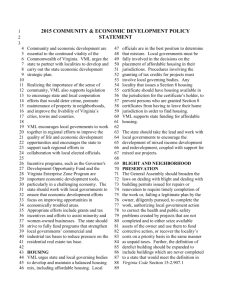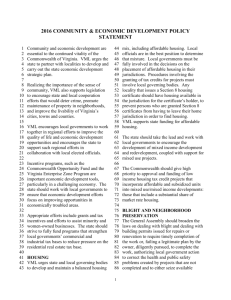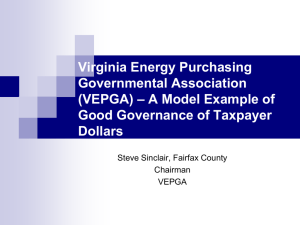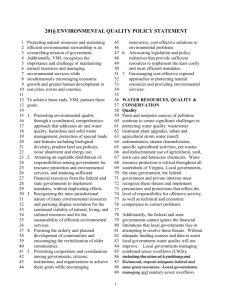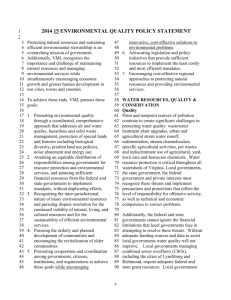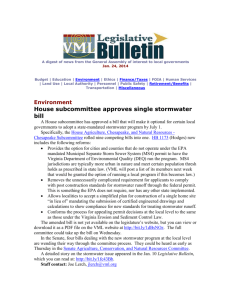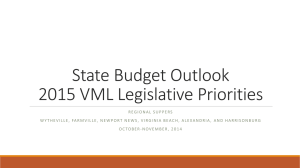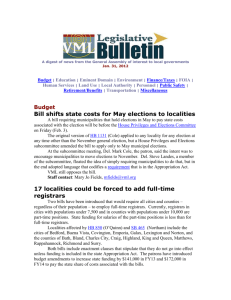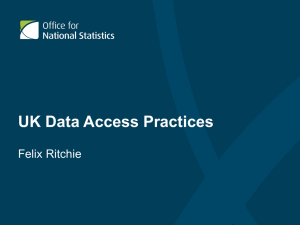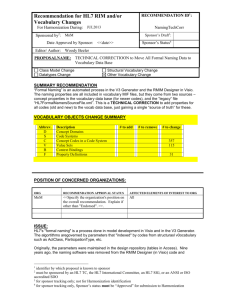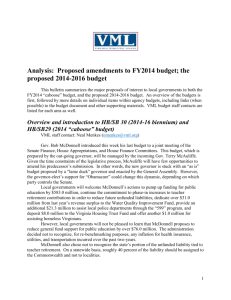2015 Environmental Quality Policy Statement
advertisement
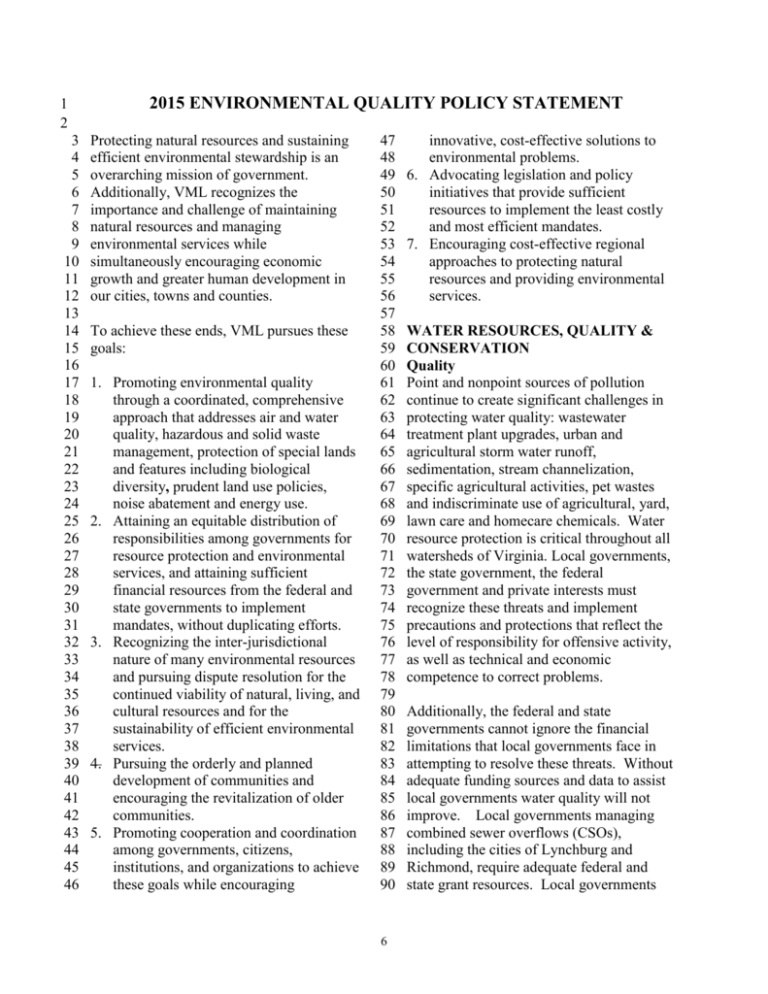
1 2 3 4 5 6 7 8 9 10 11 12 13 14 15 16 17 18 19 20 21 22 23 24 25 26 27 28 29 30 31 32 33 34 35 36 37 38 39 40 41 42 43 44 45 46 2015 ENVIRONMENTAL QUALITY POLICY STATEMENT Protecting natural resources and sustaining efficient environmental stewardship is an overarching mission of government. Additionally, VML recognizes the importance and challenge of maintaining natural resources and managing environmental services while simultaneously encouraging economic growth and greater human development in our cities, towns and counties. To achieve these ends, VML pursues these goals: 1. Promoting environmental quality through a coordinated, comprehensive approach that addresses air and water quality, hazardous and solid waste management, protection of special lands and features including biological diversity, prudent land use policies, noise abatement and energy use. 2. Attaining an equitable distribution of responsibilities among governments for resource protection and environmental services, and attaining sufficient financial resources from the federal and state governments to implement mandates, without duplicating efforts. 3. Recognizing the inter-jurisdictional nature of many environmental resources and pursuing dispute resolution for the continued viability of natural, living, and cultural resources and for the sustainability of efficient environmental services. 4. Pursuing the orderly and planned development of communities and encouraging the revitalization of older communities. 5. Promoting cooperation and coordination among governments, citizens, institutions, and organizations to achieve these goals while encouraging 47 48 49 50 51 52 53 54 55 56 57 58 59 60 61 62 63 64 65 66 67 68 69 70 71 72 73 74 75 76 77 78 79 80 81 82 83 84 85 86 87 88 89 90 6 innovative, cost-effective solutions to environmental problems. 6. Advocating legislation and policy initiatives that provide sufficient resources to implement the least costly and most efficient mandates. 7. Encouraging cost-effective regional approaches to protecting natural resources and providing environmental services. WATER RESOURCES, QUALITY & CONSERVATION Quality Point and nonpoint sources of pollution continue to create significant challenges in protecting water quality: wastewater treatment plant upgrades, urban and agricultural storm water runoff, sedimentation, stream channelization, specific agricultural activities, pet wastes and indiscriminate use of agricultural, yard, lawn care and homecare chemicals. Water resource protection is critical throughout all watersheds of Virginia. Local governments, the state government, the federal government and private interests must recognize these threats and implement precautions and protections that reflect the level of responsibility for offensive activity, as well as technical and economic competence to correct problems. Additionally, the federal and state governments cannot ignore the financial limitations that local governments face in attempting to resolve these threats. Without adequate funding sources and data to assist local governments water quality will not improve. Local governments managing combined sewer overflows (CSOs), including the cities of Lynchburg and Richmond, require adequate federal and state grant resources. Local governments 1 2 3 4 5 6 7 8 9 10 11 12 13 14 15 16 17 18 19 20 21 22 23 24 25 26 27 28 29 30 31 32 33 34 35 36 37 38 39 40 41 42 43 44 45 managing sanitary sewer overflows (SSOs) also require financial assistance. VML supports dedicated and adequate state appropriations to the Water Quality Improvement Fund to make full and timely payments under point source upgrade contracts with local governments. Additionally, VML requests the General Assembly to address costs associated with the permit requirements of Municipal Separate Storm Sewer Systems (MS4) and new EPA regulations. Local governments are legally obligated to proactively prevent water pollution and reduce its harmful effects. Because they are in close physical proximity to pollution sources, they are well-positioned to develop innovative positions. VML supports the ability of localities to employ credible and efficacious, low impact water pollution prevention and control measures without the additional burden of securing the prior review and/or permitting of state and federal agencies. Primacy The state should work to maintain the State Health Department's primacy role in implementing the federal Safe Drinking Water Act. Conservation Overuse and indiscriminate use of water, coupled with recurring drought conditions, require state and local leaders to promote water conservation to help to avoid future water supply problems. Local or regional comprehensive water conservation plans should urge conservation through construction building material choices, native and drought tolerant landscaping, appliances (such as dual flush toilets), rate structure, education and water allocation. 46 47 48 49 50 51 52 53 54 55 56 57 58 59 60 61 62 63 64 65 66 67 68 69 70 71 72 73 74 75 76 77 78 79 80 81 82 83 84 85 86 87 88 89 90 91 92 7 Conservation Easements Water authorities and similar local agencies should have the power to receive conservation easements under the authority of the Conservation Easement Act. The Virginia Outdoors Foundation’s operating costs should be fully funded. State incentives (in-lieu of tax credits) need to be created for local governments seeking to place land designated for watershed protection in conservation easements. Water Supply VML believes these principles governing the role of the Commonwealth must guide state water supply planning: 1. The availability of a safe, adequate and reliable water supply is essential to the public health and the economic vitality of the Commonwealth and its local governments. The state should participate in providing funding mechanisms for local and regional water supplies. 2. As a partner with local government in providing water supplies, the state should invest in regional projects to maximize the use of infrastructure and minimize environmental impacts. 3. Maintaining and analyzing a sound surface and ground water database is an essential state responsibility. 4. The state must take an advocacy role to support local water supply projects that conform to state regulations. This includes taking the lead in negotiating multi-state issues. 5. VML supports adequate state environmental staffing in the areas of research and development, including legal research into issues such as inter-basin transfers, which results in stronger technical assistance to municipal government. 1 2 3 4 5 6 7 8 9 10 11 12 13 14 15 16 17 18 19 20 21 22 23 24 25 26 27 28 29 30 31 32 33 34 35 36 37 38 39 40 41 42 43 44 45 46 47 6. The State should encourage water conservation measures to promote wise use and prevent and minimize waste through incentives and educational programs. 7. The Commonwealth should consider use of reclaimed water to meet non-potable needs as part of its water resources to reduce the demand on high quality potable water supplies where practicable and environmentally beneficial. State officials should assist local governments and communities in promoting wastewater reclamation and reuse. 8. Managing water resources should include protecting water sources by such techniques as open space conservation easements held by state and local land trusts. 9. Water is essential to a healthy ecosystem. Stream flows to support beneficial in-stream uses should be protected in the process of providing sufficient water to meet public drinking water requirements. Local governments must continue to participate in the discussion of any water resource proposals, including the current statewide water supply planning process. Water supplies are important to local governments for many reasons and constitute a common resource that should be managed as such. ENVIRONMENTAL EMERGENCIES The state should assist with paying for flood protection where localities take precautions, through land use controls, to limit the cost of flood damage restoration. Localities need increased funding for dam safety updates. In the event of an environmental emergency, or an act of God, local government officials 48 49 50 51 52 53 54 55 56 57 58 59 60 61 62 63 64 65 66 67 68 69 70 71 72 73 74 75 76 77 78 79 80 81 82 83 84 85 86 87 88 89 90 91 92 93 94 8 need maximum discretion to determine measures to be taken beyond those dictated by the state and federal government, as well as ready access to information and training. SOLID WASTE MANAGEMENT VML supports the continuation of certifying compliance with local ordinances for waste management facility proposals. VML endorses developing local waste-toenergy and co-generation facilities as practical alternatives to landfill facilities. To achieve these goals, VML asks the federal and state agencies, as well as the Virginia General Assembly, to fund research into new technologies and processes leading to the development of alternative solid waste management practices. VML supports efforts to ensure that Waste to Energy (WTE) is consistently defined as a renewable energy source in any renewable energy standards relating to the Commonwealth. Currently the Code of Virginia defines "renewable energy" as including energy derived from waste. VML state financial assistance in developing programs that reduce waste entering local landfills, thereby increasing their longevity. Such programs should emphasize (in order) processes that reduce waste, reuse materials, and recycle refuse. HAZARDOUS WASTE Advanced technology, waste minimization, and waste exchange should be used, to the extent possible, to eliminate or reduce hazardous waste. VML recognizes the need for hazardous waste treatment and disposal facilities to provide adequate capacity for wastes generated within state borders. VML encourages the Commonwealth to establish, and if necessary, to operate, hazardous waste 1 2 3 4 5 6 7 8 9 10 11 12 13 14 15 16 17 18 19 20 21 22 23 24 25 26 27 28 29 30 31 32 33 34 35 36 37 38 39 40 41 42 43 44 45 46 facilities appropriate for improving the treatment, storage, or disposal of hazardous waste generated within Virginia. Adequate state and federal funding should be provided for cleaning up abandoned and hazardous waste sites. Expedient clean-up of sites is essential. The Commonwealth should address the collection of household hazardous waste by collecting it or providing liability coverage for local collection programs. Consumer education and discouraging reliance on household chemicals should be encouraged. The state needs to address pharmaceuticals and associated endocrine disruptors, including collection/disposition, and to encourage pharmacies to accept unused pharmaceuticals. State research institutions should examine and provide policy recommendations on the impact of pharmaceuticals and endocrine disruptors to water quality, agricultural products, and human health. PARKS, OPEN SPACE AND CULTURAL RESOURCES VML supports the renewal of federal funding for parks, historical structure preservation and recreational opportunities. The federal Land and Water Conservation Fund (LWCF) program provides matching grants to States and local governments for the acquisition and development of public outdoor recreation areas and facilities. VML encourages state officials to work with local officials in combining matching dollars for LWCF grants for local and regional facilities. VML also supports additional state funding for local land preservation through Virginia Land Conservation Foundation (VLCF) grants and matching grants to localities for qualifying purchase of development rights (PDR) programs 47 48 49 50 51 52 53 54 55 56 57 58 59 60 61 62 63 64 65 66 67 68 69 70 71 72 73 74 75 76 77 78 79 80 81 82 83 84 85 86 87 88 89 90 91 92 93 9 NOISE CONTROL State and federal governments must assume the regulatory and financial responsibility of attaining satisfactory noise levels adjacent to major highways and airports. ENERGY USE & CLIMATE CHANGE The state should maintain an overall state energy plan that includes provisions for energy emergencies. Regulations and emergency orders should include alternatives that consider the economic impact on political subdivisions that border neighboring states. Clean energy sources should be emphasized, and both long and short-range energy usage should be designed to maximize conservation of energy resources. Conservation should be the highest priority in formulating state and local energy policies and plans. Virginia should require energy conservation measures for all utilities operating in the state. These measurers will help the state to reduce energy costs to consumers and increase the available supply of energy without further degradation of the environment. VML supports the creation of an independent office of the consumer advocate within the state government to actively participate in transmission line issues. VML supports state assistance to help local governments, businesses and residents obtain energy audits. VML also supports state tax incentives for (1) energy efficiency; and (2) homeowners using renewable energy, including solar, geothermal, wind and others. VML encourages the Commonwealth to develop building code standards that 1 2 3 4 5 6 7 8 9 10 11 12 13 14 15 16 17 18 19 20 21 22 23 24 25 26 27 28 29 30 31 32 33 34 35 36 37 38 39 40 41 42 43 44 45 46 47 enhance environmental sustainability and energy efficiency and to enact policies that enable local governments to promote environmental sustainability and energy efficiency in construction. VML recognizes that the impacts of global climate change, as it relates to relative sealevel rise, habitat destruction and alteration, temperature increase, and variations in seasonal rainfall patterns, has the potential to negatively impact our communities. State officials should provide tools to localities to take inventory of greenhouse emissions output and assist with greenhouse gas emission reduction plans. CHESAPEAKE BAY The Chesapeake Bay provides vital economic and recreational benefits to all Virginians. The Commonwealth and federal government must assume responsibility for leading the clean-up of the Bay and work with its local governments -- in addition to the neighboring states -- to develop interstate as well as intrastate strategies designed to "Save the Bay." The Chesapeake Bay is a national treasure, and the state must work with the federal government to ensure adequate financial resources are available to implement the plan for complying with federal Clean Water Act. At the federal level VML supports accountability and oversight which seeks to achieve greater cost-effectiveness in meeting pollution reduction targets. This will help localities address the expensive costs associated with the Chesapeake Bay cleanup. Living resources such as oysters, crabs and underwater grasses are critical to water quality. Oysters in particular have the capacity to filter sediments and reduce pollutants. While reductions from sewage treatment plants and urban runoff are important to restoring the bay it will become 48 49 50 51 52 53 54 55 56 57 58 59 60 61 62 63 64 65 66 67 68 69 70 71 72 73 74 75 76 77 78 79 80 81 82 83 84 85 86 87 88 89 90 91 92 93 94 10 increasingly expensive to reduce a smaller amount of pollutants from these sources resulting in a diminishing return for investment. Increasing those living resources that improve water quality should be considered as an alternative to expensive retrofits of urban areas. The Commonwealth must continue to share in the funding of local government water quality improvement projects in Virginia at appropriate levels designed to clean up the Bay. The Commonwealth would defeat the spirit of community partnership if it required local governments to undertake unfunded mandates designed to remove the Chesapeake Bay from the EPA’s impaired waters list. HIGHWAY BEAUTIFICATION VML is discouraged that modification to the Federal Highway Beautification Act has undermined local authority and continues to allow tree-cutting simply for billboard visibility. The General Assembly should enact legislation that restores local government authority to remove billboards along federal highways through amortization; supports local governments’ ability to require non-conforming signs along federal highways to comply with size and height requirements without cash payments; allows local governments to require the removal of billboards in inappropriate locations, especially in rurallydesignated scenic, historic, and residential areas; and provides local governments with the authority by local ordinance to prohibit the construction or to determine the placement of any new billboards. VML encourages the local identification of roads with special natural, historical, scenic, or cultural values and encourages local enhancement and protection of these scenic byways. 1 2 3 4 5 6 7 8 9 10 11 12 13 14 15 16 17 18 19 20 21 22 23 24 25 26 27 28 29 30 31 32 33 34 35 36 37 38 39 40 41 42 43 44 45 46 47 TRANSPORTATION AND LOCAL LAND USE PLANNING VML supports the re-initiation of the state's former environmental review procedure for state highway projects. VML recognizes the potential benefits of such a procedure including the benefits to transportation planning and resource management. However, any such procedure and/or review is incomplete if it does not evaluate the proposed impacts against the state-required local comprehensive plans. VML believes that the environmental review process for public roads should incorporate the local comprehensive plan and involve and take into the account the views of local officials. In all permitting, the DEQ should defer to local zoning decisions prior to the issuance of any permits. Moreover, in exercising its permitting authority, DEQ should recognize the possible cumulative impacts of its permitting activities. HAZARDOUS LIQUID AND GAS PIPELINES The Commonwealth and local governments should adopt appropriate restrictions on development near liquid and gas pipelines and require liquid and gas pipeline operators to take safeguards to reduce the risk of oil spills, particularly in environmentally sensitive areas. BIOSOLIDS VML supports and encourages the beneficial recycle/reuse of biosolids on farms and as a crop nutrient and soil amendment in accordance with federal and state handling and disposal regulations, and supports local authority to monitor and reasonably regulate biosolids. VML supports full compliance with all applicable federal, state and local requirements regarding production at the wastewater treatment facility, and management, transportation, storage and use of biosolids away from the facility. This includes good housekeeping practices for 48 49 50 51 52 53 54 55 56 57 58 59 60 61 62 63 64 65 66 67 68 69 70 71 72 73 74 75 76 77 78 79 80 81 82 83 84 85 86 87 88 89 90 91 92 93 94 11 biosolids production, processing, transport and storage, and during final use or disposal operations. GREEN BUILDING VML supports the construction of buildings that are energy efficient, maximize natural light, minimize stormwater runoff, use recycled materials, and use other environmentally responsible practices. Local governments, state agencies and developers can obtain guidance from the U.S. Green Building Council and the LEED (Leadership in Energy and Environmental Design) Green Building Rating System. VML applauds the efforts of the Virginia Department of Conservation and Recreation, the Virginia Department of Housing and Community Development, the Department of Environmental Quality and others to implement green building design and construction, and encourages greater use of these environmentally sound and energy efficient techniques. Ideally, all public buildings should be LEED, or the equivalent, certified. URANIUM MINING Uranium mining, milling and waste disposal of generated wastes poses health and environmental problems for Virginians. Prior to uranium mining activities being permitted in Virginia, VML supports studies, including those currently underway, that would evaluate the impacts of radiation and other pollutants from mill tailings on (1) downstream water supplies; and (2) the health and safety of uranium miners. VML supports the current moratorium on the mining and milling of uranium in the Commonwealth of Virginia until studies demonstrate that it is safe for the environment and health of citizens. Any studies or efforts to develop a regulatory framework should address the concerns, 1 2 3 4 5 6 7 8 9 10 11 12 13 14 15 16 17 18 19 20 21 22 23 24 warnings, and conclusions contained in the National Academies of Sciences report to the Commonwealth entitled “Uranium Mining in Virginia” and dated December 2011. Furthermore, the state should take no action to preempt, eliminate, or preclude local government jurisdiction with respect to whether uranium mining would be allowed in the respective jurisdiction. HYDRAULIC FRACTURING The process of hydraulic fracturing raises concerns about the potential pollution of groundwater, the depletion of water supplies and an increase in seismic activity in previously benign or inactive zones. The consequences potentially are costly, irreversible and devastating to local communities. VML supports a state regulatory program that addresses these concerns while protecting the authority of local governments to regulate this type of mining activity through its land use ordinances. 12
